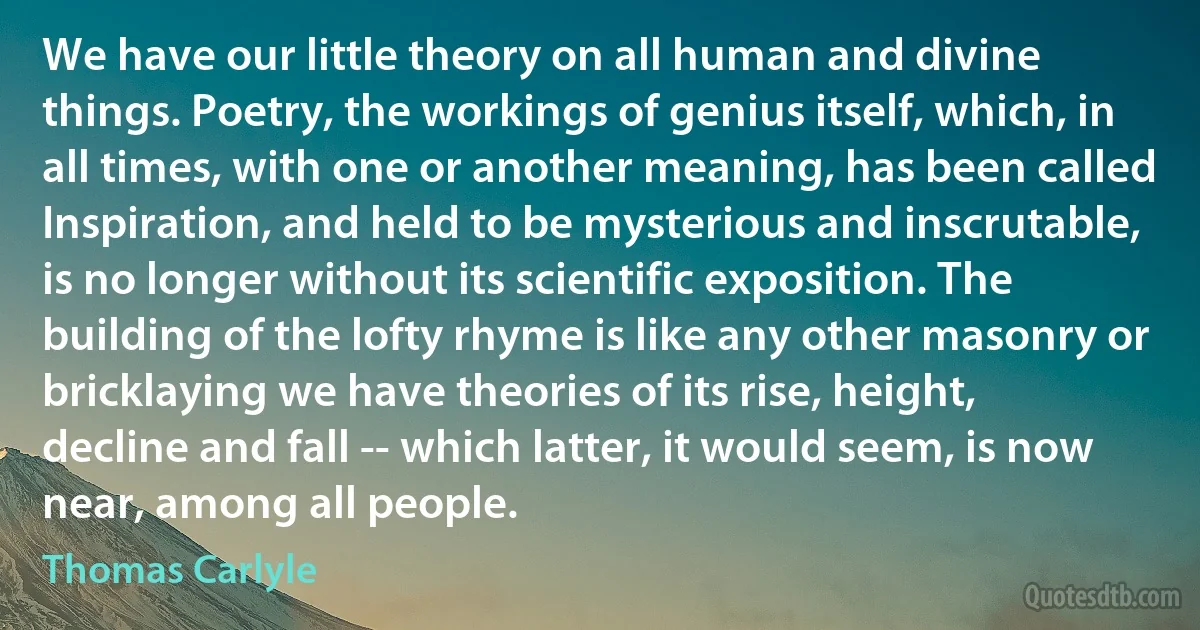Exposition Quotes - page 3
I presume that to the uninitiated the formulae will appear cold and cheerless; but let it be remembered that, like other mathematical formulae, they find their origin in the divine source of all geometry. Whether I shall have the satisfaction of taking part in their exposition, or whether that will remain for some more profound expositor, will be seen in the future.

Benjamin Peirce
Formally this work is divided into four parts, but in a sense it consists of two short treatises. One is an exposition of a theory of cooperation and organization and constitutes the first half of the book. The second is a study of the functions and of the methods of operation of executives in formal organizations.

Chester Barnard
In Indian Philosophy he not only laid a stone foundation surely and truly but also built an edifice that shall outlast any philosophic storm. It was not so much a history as an exposition, and the exposition was vivid, vital and gripping. It was full of feeling. It made an epoch by itself. It was the two volumes of Indian Philosophy in the "Library of Philosophy" that showed that there was hardly any height of spiritual insight or rational philosophy attained in the world that has not its parallel in the vast stretch he dealt with that lies between the early sages and the modern Naiyaikas [leaders].

Sarvepalli Radhakrishnan
In his short life of thirty-two years Shankara achieved that union of sage and saint, of wisdom and kindliness, which characterizes the loftiest type of man produced in India... There is much metaphysical wind in these discourses, and arid deserts of textual exposition; but they may be forgiven in a man who at the age of thirty could be at once the Aquinas and the Kant of India... Shankara establishes the source of his philosophy at a remote and subtle point never quite clearly visioned again until, a thousand years later, Immanuel Kant wrote his Critique of Pure Reason... We do not know how much Parmenides' insistence that the Many are unreal, and that only the One exists, owed to the Upanishads, or contributed to Shankara; nor can we establish any connection, of cause or suggestion, between Shankara and the astonishingly similar philosophy of Immanuel Kant.

Adi Shankara
In 1665 Wallis published the first systematic treatise on Analytical conic sections. Analytical geometry was invented by Descartes and the first exposition of it was given in 1637: that exposition was both difficult and obscure, and to most of his contemporaries, to whom the method was new, it must have been incomprehensible. Wallis made the method intelligible to all mathematicians. This is the first book in which these curves are considered and defined as curves of the second degree and not as sections of a cone.

John Wallis
It is to the Italian astronomer, forced in old age by the Inquisition to turn aside from the more dangerous study of the machinery of the heavens, that we owe the first exposition of many of the problems of mechanics and statics, published... in 1638. Not only did Galileo put together whatever the sixteenth century had learned in the sciences affecting building construction, but from his study of the bending strength of a beam there dates a new branch of science-the theory of the strength of materials.

Galileo Galilei
There are two sorts of hypocrites: one that are deceived with their outward morality and external religion; many of which are professed Arminians, in the doctrine of justification: and the other, are those that are deceived with false discoveries and elevations; which often cry down works, and men's own righteousness, and talk much of free grace; but at the same time make a righteousness of their discoveries, and of their humiliation, and exalt themselves to heaven with them. These two kinds of hypocrites, Mr. Shepard, in his Exposition of the Parable of the Ten Virgins, distinguishes by the names of legal and evangelical hypocrites; and often speaks of the latter as the worst. And it is evident that the latter are commonly by far the most confident in their hope, and with the most difficulty brought off from it: I have scarcely known the instance of such a one, in my life, that has been undeceived.

Jonathan Edwards (theologian)
[After leaving the w:Exposition Universelle (1855) ].. .I went to the Courbet exposition. He has reduced the price of admission to ten sous. I stayed there alone for nearly one hour and discovered a masterpiece in the picture, they rejected [the jury of the official Salon exhibition in Paris]. I simply could not tear myself away from the sight of it.. ..In [Courbet's painting 'The Studio'] the planes are well understood. There is atmosphere, and in some passages the execution is really remarkable, especially the tights and hips of the nude model and the breasts.. .The only fault is that the picture, as he painted it, seems to contain an ambiguity. It looks as though there were a real sky in the middle of the painting. They [The Salon-jury] have rejected one of the most remarkable works of our time, but Courbet is not the man to be discouraged by a little thing like that.

Gustave Courbet
Certain critics from the democratic camp, inclined to operate with the help of indirect evidence, have looked upon the "ironic” attitude of the author to the compromise leaders as the expression of an undue subjectivism vitiating the scientific character of his exposition. We venture to regard this criterion as unconvincing. Spinoza's principle, "not to weep or laugh, but to understand” gives warning against inappropriate laughter and untimely tears. It does not deprive a man, even though he be a historian, of the right to his share of tears and laughter when justified by a correct understanding of the material itself.

Baruch Spinoza
Understanding shows us that prayer is more than asking God for help in this physical world; it is in its highest sense the opening up in our soul of an innate spiritual umbilical cord that connects us with the Holy Mother, from whom we can receive a perpetual flow of life. This is the beginning of eternal life for both soul and body, the essential teaching of Jesus, which He demonstrated in overcoming death. We have earnestly sought to know and tell others how to pray, and this book is our very best exposition of the subject.

Charles Fillmore



